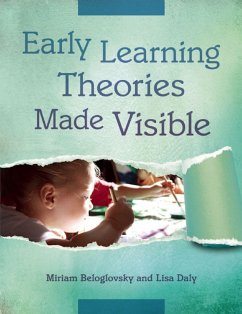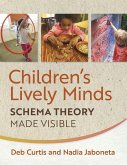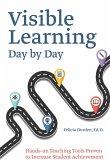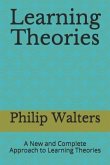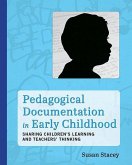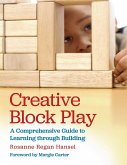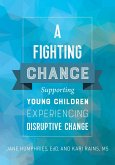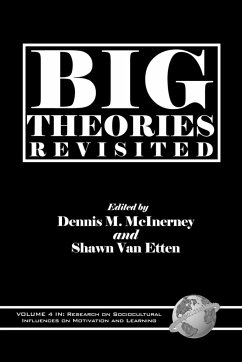- Broschiertes Buch
- Merkliste
- Auf die Merkliste
- Bewerten Bewerten
- Teilen
- Produkt teilen
- Produkterinnerung
- Produkterinnerung
Go beyond reading about early learning theories and see what they look like in action in modern programmes and teacher practices. With classroom vignettes and colourful photographs, this book makes the works of Jean Piaget, Erik Erikson, Lev Vygotsky, Abraham Maslow, John Dewey, Howard Gardner, and Louise Derman-Sparks visible, accessible, and easier to understand.
Andere Kunden interessierten sich auch für
![Children's Lively Minds: Schema Theory Made Visible Children's Lively Minds: Schema Theory Made Visible]() Deb CurtisChildren's Lively Minds: Schema Theory Made Visible50,99 €
Deb CurtisChildren's Lively Minds: Schema Theory Made Visible50,99 €![Visible Learning Day by Day: Hands-On Teaching Tools Proven to Increase Student Achievement Visible Learning Day by Day: Hands-On Teaching Tools Proven to Increase Student Achievement]() Felicia DurdenVisible Learning Day by Day: Hands-On Teaching Tools Proven to Increase Student Achievement15,99 €
Felicia DurdenVisible Learning Day by Day: Hands-On Teaching Tools Proven to Increase Student Achievement15,99 €![Learning Theories: A New and Complete Approach to Learning Theories Learning Theories: A New and Complete Approach to Learning Theories]() Philip WaltersLearning Theories: A New and Complete Approach to Learning Theories29,99 €
Philip WaltersLearning Theories: A New and Complete Approach to Learning Theories29,99 €![Pedagogical Documentation in Early Childhood Pedagogical Documentation in Early Childhood]() Susan StaceyPedagogical Documentation in Early Childhood37,99 €
Susan StaceyPedagogical Documentation in Early Childhood37,99 €![Creative Block Play: A Comprehensive Guide to Learning Through Building Creative Block Play: A Comprehensive Guide to Learning Through Building]() Rosanne HanselCreative Block Play: A Comprehensive Guide to Learning Through Building42,99 €
Rosanne HanselCreative Block Play: A Comprehensive Guide to Learning Through Building42,99 €![A Fighting Chance: Supporting Young Children Experiencing Disruptive Change A Fighting Chance: Supporting Young Children Experiencing Disruptive Change]() Jane HumphriesA Fighting Chance: Supporting Young Children Experiencing Disruptive Change32,99 €
Jane HumphriesA Fighting Chance: Supporting Young Children Experiencing Disruptive Change32,99 €![Big Theories Revisited (PB) Big Theories Revisited (PB)]() Big Theories Revisited (PB)61,99 €
Big Theories Revisited (PB)61,99 €-
-
-
Go beyond reading about early learning theories and see what they look like in action in modern programmes and teacher practices. With classroom vignettes and colourful photographs, this book makes the works of Jean Piaget, Erik Erikson, Lev Vygotsky, Abraham Maslow, John Dewey, Howard Gardner, and Louise Derman-Sparks visible, accessible, and easier to understand.
Hinweis: Dieser Artikel kann nur an eine deutsche Lieferadresse ausgeliefert werden.
Hinweis: Dieser Artikel kann nur an eine deutsche Lieferadresse ausgeliefert werden.
Produktdetails
- Produktdetails
- Verlag: Redleaf Press
- Seitenzahl: 220
- Erscheinungstermin: 10. Februar 2015
- Englisch
- Abmessung: 272mm x 211mm x 13mm
- Gewicht: 771g
- ISBN-13: 9781605542362
- ISBN-10: 1605542369
- Artikelnr.: 40557104
- Herstellerkennzeichnung
- Libri GmbH
- Europaallee 1
- 36244 Bad Hersfeld
- gpsr@libri.de
- Verlag: Redleaf Press
- Seitenzahl: 220
- Erscheinungstermin: 10. Februar 2015
- Englisch
- Abmessung: 272mm x 211mm x 13mm
- Gewicht: 771g
- ISBN-13: 9781605542362
- ISBN-10: 1605542369
- Artikelnr.: 40557104
- Herstellerkennzeichnung
- Libri GmbH
- Europaallee 1
- 36244 Bad Hersfeld
- gpsr@libri.de
Miriam Beloglovsky: Miriam Beloglovsky, MA, is a professor of early childhood education at Cosumnes River College in Sacramento, California, and has the pleasure of advising and guiding students for over 25 years. She is a strong advocate for children, youth, and families, and consults and supports a variety of family, children, and youth programs, including THRIVE Family Development Network and My Street of Dreams. She has served as a keynote speaker, presenter, and board member to a number of organizations and conferences. Lisa Daly: Lisa Daly, MA, is professor of early childhood education at Folsom Lake College in Folsom, California. She has over 30 years of experience as an early childhood teacher, director, and educator. She has served on community and Association for the Education of Young Children (AEYC) boards, including the statewide Child Development Training Consortium advisory board. She is passionate about creative arts and has directed art programs for thousands of children at community family events and camps; and she and has presented numerous workshops for educators on art, storytelling, language and literacy, sensory experiences, and music and movement.
Working TOC
Introduction
Chapter 1: Theories as a Framework to Support Children
Introducing the Theorists (Summary of basic theory and an example story for
each)
Jean Piaget
Erik Erikson
Lev Vygotsky
Abraham Maslow
John Dewey
Howard Gardner
Louise Derman-Sparks
Reflective Teaching and the Child Development Theories
Qualities of Reflective Teachers
The Reflective Process: (example story-reflective teacher's process with
her class)
NOTE: The text on the theorists in the next three sections follows the same
format:
Defining the Theory
Story
Visible Theories-Connecting Story and Theory
What's My Role? Action Steps for Teachers and Environment
Part 1:
Social Emotional Development: Building Relationships to Learn
Arguments, Discussion and Disagreements that Build Relationships: Jean
Piaget on Social-Emotional Development of Young Children
Children's Sense of Identity and Social Integration: Erik Erikson on
Social-Emotional Development of Young Children
How Children Communicate Their Understanding of the World: Lev Vygotsky on
Social-Emotional Development of Young Children
Gaining Self-Regulation and Emotional Stability: Abraham Maslow on
Social-Emotional Development of Young Children
Dramatic Play at the Core of Collaboration and Negotiation: John Dewey on
Social-Emotional Development of Young Children
Multiple Intelligences as a Tool to Develop Self-Esteem: Howard Gardner on
Social-Emotional Development of Young Children
It's Not Fair! Children as Social Activists: Louise Derman-Sparks'
Anti-Bias Curriculum and the Social-Emotional Development of Young Children
Conclusion (of the overall domain)
Your Turn: Example Story and Guiding Questions
Reflection Questions
Part 2:
Cognitive Development: Children as Protagonists of Their Own Knowledge
Introducing the Domain: Beyond ABCs and 1, 2, 3s
Children as Active Learners: Jean Piaget on Cognitive Development of Young
Children
Taking Initiative to Gain Mastery that Supports Learning: Erik Erikson on
Cognitive Development of Young Children
How Children's Play Improves Learning: Lev Vygotsky on Cognitive
Development of Young Children
Art as a Language that Promotes Thinking and Self-Actualization: Abraham
Maslow on Cognitive Development of Young Children
Democracy in the Making: John Dewey on Cognitive Development of Young
Children
Using Multiple Intelligences to Acquire Knowledge: Howard Gardner on
Cognitive Development of Young Children
Engaging Children in Deeper Thinking: Louise Derman-Sparks on Cognitive
Development of Young Children
Conclusion (of the overall domain)
Your Turn: Example Story and Guiding Questions
Reflection Questions
Part 3:
Physical Development: Using the Body as a Tool for Discovery
Introducing the Domain: Beyond Gross Motor and Fine Motor Skills
Bodies as Tools for Discovery: Jean Piaget on the Physical Development of
Young Children
Promoting Physical Mastery: Erik Erikson on the Physical Development of
Young Children
Scaffolding and Learning through Physical Development: Lev Vygotsky on
Physical Development of Young Children
Physical Strength that Support Self-Actualization: Abraham Maslow on the
Physical Development of Young Children
Collaborative Play that Promotes Physical Skills: John Dewey on the
Physical Development of Young Children
Bodily-Kinesthetic Learning: Howard Gardner on the Physical Development of
Young Children
Bodies as Identity: Louise Derman-Sparks on the Physical Development of
Young Children
Conclusion (of the overall domain)
Your Turn: Example Story and Guiding Questions
Reflection Questions
Part 4:
Changing the Assumptions of Early Care and Education-How the Theories Give
Us a Voice to Initiate Change
Crystal's Story
Final Thoughts
Introduction
Chapter 1: Theories as a Framework to Support Children
Introducing the Theorists (Summary of basic theory and an example story for
each)
Jean Piaget
Erik Erikson
Lev Vygotsky
Abraham Maslow
John Dewey
Howard Gardner
Louise Derman-Sparks
Reflective Teaching and the Child Development Theories
Qualities of Reflective Teachers
The Reflective Process: (example story-reflective teacher's process with
her class)
NOTE: The text on the theorists in the next three sections follows the same
format:
Defining the Theory
Story
Visible Theories-Connecting Story and Theory
What's My Role? Action Steps for Teachers and Environment
Part 1:
Social Emotional Development: Building Relationships to Learn
Arguments, Discussion and Disagreements that Build Relationships: Jean
Piaget on Social-Emotional Development of Young Children
Children's Sense of Identity and Social Integration: Erik Erikson on
Social-Emotional Development of Young Children
How Children Communicate Their Understanding of the World: Lev Vygotsky on
Social-Emotional Development of Young Children
Gaining Self-Regulation and Emotional Stability: Abraham Maslow on
Social-Emotional Development of Young Children
Dramatic Play at the Core of Collaboration and Negotiation: John Dewey on
Social-Emotional Development of Young Children
Multiple Intelligences as a Tool to Develop Self-Esteem: Howard Gardner on
Social-Emotional Development of Young Children
It's Not Fair! Children as Social Activists: Louise Derman-Sparks'
Anti-Bias Curriculum and the Social-Emotional Development of Young Children
Conclusion (of the overall domain)
Your Turn: Example Story and Guiding Questions
Reflection Questions
Part 2:
Cognitive Development: Children as Protagonists of Their Own Knowledge
Introducing the Domain: Beyond ABCs and 1, 2, 3s
Children as Active Learners: Jean Piaget on Cognitive Development of Young
Children
Taking Initiative to Gain Mastery that Supports Learning: Erik Erikson on
Cognitive Development of Young Children
How Children's Play Improves Learning: Lev Vygotsky on Cognitive
Development of Young Children
Art as a Language that Promotes Thinking and Self-Actualization: Abraham
Maslow on Cognitive Development of Young Children
Democracy in the Making: John Dewey on Cognitive Development of Young
Children
Using Multiple Intelligences to Acquire Knowledge: Howard Gardner on
Cognitive Development of Young Children
Engaging Children in Deeper Thinking: Louise Derman-Sparks on Cognitive
Development of Young Children
Conclusion (of the overall domain)
Your Turn: Example Story and Guiding Questions
Reflection Questions
Part 3:
Physical Development: Using the Body as a Tool for Discovery
Introducing the Domain: Beyond Gross Motor and Fine Motor Skills
Bodies as Tools for Discovery: Jean Piaget on the Physical Development of
Young Children
Promoting Physical Mastery: Erik Erikson on the Physical Development of
Young Children
Scaffolding and Learning through Physical Development: Lev Vygotsky on
Physical Development of Young Children
Physical Strength that Support Self-Actualization: Abraham Maslow on the
Physical Development of Young Children
Collaborative Play that Promotes Physical Skills: John Dewey on the
Physical Development of Young Children
Bodily-Kinesthetic Learning: Howard Gardner on the Physical Development of
Young Children
Bodies as Identity: Louise Derman-Sparks on the Physical Development of
Young Children
Conclusion (of the overall domain)
Your Turn: Example Story and Guiding Questions
Reflection Questions
Part 4:
Changing the Assumptions of Early Care and Education-How the Theories Give
Us a Voice to Initiate Change
Crystal's Story
Final Thoughts
Working TOC
Introduction
Chapter 1: Theories as a Framework to Support Children
Introducing the Theorists (Summary of basic theory and an example story for
each)
Jean Piaget
Erik Erikson
Lev Vygotsky
Abraham Maslow
John Dewey
Howard Gardner
Louise Derman-Sparks
Reflective Teaching and the Child Development Theories
Qualities of Reflective Teachers
The Reflective Process: (example story-reflective teacher's process with
her class)
NOTE: The text on the theorists in the next three sections follows the same
format:
Defining the Theory
Story
Visible Theories-Connecting Story and Theory
What's My Role? Action Steps for Teachers and Environment
Part 1:
Social Emotional Development: Building Relationships to Learn
Arguments, Discussion and Disagreements that Build Relationships: Jean
Piaget on Social-Emotional Development of Young Children
Children's Sense of Identity and Social Integration: Erik Erikson on
Social-Emotional Development of Young Children
How Children Communicate Their Understanding of the World: Lev Vygotsky on
Social-Emotional Development of Young Children
Gaining Self-Regulation and Emotional Stability: Abraham Maslow on
Social-Emotional Development of Young Children
Dramatic Play at the Core of Collaboration and Negotiation: John Dewey on
Social-Emotional Development of Young Children
Multiple Intelligences as a Tool to Develop Self-Esteem: Howard Gardner on
Social-Emotional Development of Young Children
It's Not Fair! Children as Social Activists: Louise Derman-Sparks'
Anti-Bias Curriculum and the Social-Emotional Development of Young Children
Conclusion (of the overall domain)
Your Turn: Example Story and Guiding Questions
Reflection Questions
Part 2:
Cognitive Development: Children as Protagonists of Their Own Knowledge
Introducing the Domain: Beyond ABCs and 1, 2, 3s
Children as Active Learners: Jean Piaget on Cognitive Development of Young
Children
Taking Initiative to Gain Mastery that Supports Learning: Erik Erikson on
Cognitive Development of Young Children
How Children's Play Improves Learning: Lev Vygotsky on Cognitive
Development of Young Children
Art as a Language that Promotes Thinking and Self-Actualization: Abraham
Maslow on Cognitive Development of Young Children
Democracy in the Making: John Dewey on Cognitive Development of Young
Children
Using Multiple Intelligences to Acquire Knowledge: Howard Gardner on
Cognitive Development of Young Children
Engaging Children in Deeper Thinking: Louise Derman-Sparks on Cognitive
Development of Young Children
Conclusion (of the overall domain)
Your Turn: Example Story and Guiding Questions
Reflection Questions
Part 3:
Physical Development: Using the Body as a Tool for Discovery
Introducing the Domain: Beyond Gross Motor and Fine Motor Skills
Bodies as Tools for Discovery: Jean Piaget on the Physical Development of
Young Children
Promoting Physical Mastery: Erik Erikson on the Physical Development of
Young Children
Scaffolding and Learning through Physical Development: Lev Vygotsky on
Physical Development of Young Children
Physical Strength that Support Self-Actualization: Abraham Maslow on the
Physical Development of Young Children
Collaborative Play that Promotes Physical Skills: John Dewey on the
Physical Development of Young Children
Bodily-Kinesthetic Learning: Howard Gardner on the Physical Development of
Young Children
Bodies as Identity: Louise Derman-Sparks on the Physical Development of
Young Children
Conclusion (of the overall domain)
Your Turn: Example Story and Guiding Questions
Reflection Questions
Part 4:
Changing the Assumptions of Early Care and Education-How the Theories Give
Us a Voice to Initiate Change
Crystal's Story
Final Thoughts
Introduction
Chapter 1: Theories as a Framework to Support Children
Introducing the Theorists (Summary of basic theory and an example story for
each)
Jean Piaget
Erik Erikson
Lev Vygotsky
Abraham Maslow
John Dewey
Howard Gardner
Louise Derman-Sparks
Reflective Teaching and the Child Development Theories
Qualities of Reflective Teachers
The Reflective Process: (example story-reflective teacher's process with
her class)
NOTE: The text on the theorists in the next three sections follows the same
format:
Defining the Theory
Story
Visible Theories-Connecting Story and Theory
What's My Role? Action Steps for Teachers and Environment
Part 1:
Social Emotional Development: Building Relationships to Learn
Arguments, Discussion and Disagreements that Build Relationships: Jean
Piaget on Social-Emotional Development of Young Children
Children's Sense of Identity and Social Integration: Erik Erikson on
Social-Emotional Development of Young Children
How Children Communicate Their Understanding of the World: Lev Vygotsky on
Social-Emotional Development of Young Children
Gaining Self-Regulation and Emotional Stability: Abraham Maslow on
Social-Emotional Development of Young Children
Dramatic Play at the Core of Collaboration and Negotiation: John Dewey on
Social-Emotional Development of Young Children
Multiple Intelligences as a Tool to Develop Self-Esteem: Howard Gardner on
Social-Emotional Development of Young Children
It's Not Fair! Children as Social Activists: Louise Derman-Sparks'
Anti-Bias Curriculum and the Social-Emotional Development of Young Children
Conclusion (of the overall domain)
Your Turn: Example Story and Guiding Questions
Reflection Questions
Part 2:
Cognitive Development: Children as Protagonists of Their Own Knowledge
Introducing the Domain: Beyond ABCs and 1, 2, 3s
Children as Active Learners: Jean Piaget on Cognitive Development of Young
Children
Taking Initiative to Gain Mastery that Supports Learning: Erik Erikson on
Cognitive Development of Young Children
How Children's Play Improves Learning: Lev Vygotsky on Cognitive
Development of Young Children
Art as a Language that Promotes Thinking and Self-Actualization: Abraham
Maslow on Cognitive Development of Young Children
Democracy in the Making: John Dewey on Cognitive Development of Young
Children
Using Multiple Intelligences to Acquire Knowledge: Howard Gardner on
Cognitive Development of Young Children
Engaging Children in Deeper Thinking: Louise Derman-Sparks on Cognitive
Development of Young Children
Conclusion (of the overall domain)
Your Turn: Example Story and Guiding Questions
Reflection Questions
Part 3:
Physical Development: Using the Body as a Tool for Discovery
Introducing the Domain: Beyond Gross Motor and Fine Motor Skills
Bodies as Tools for Discovery: Jean Piaget on the Physical Development of
Young Children
Promoting Physical Mastery: Erik Erikson on the Physical Development of
Young Children
Scaffolding and Learning through Physical Development: Lev Vygotsky on
Physical Development of Young Children
Physical Strength that Support Self-Actualization: Abraham Maslow on the
Physical Development of Young Children
Collaborative Play that Promotes Physical Skills: John Dewey on the
Physical Development of Young Children
Bodily-Kinesthetic Learning: Howard Gardner on the Physical Development of
Young Children
Bodies as Identity: Louise Derman-Sparks on the Physical Development of
Young Children
Conclusion (of the overall domain)
Your Turn: Example Story and Guiding Questions
Reflection Questions
Part 4:
Changing the Assumptions of Early Care and Education-How the Theories Give
Us a Voice to Initiate Change
Crystal's Story
Final Thoughts

